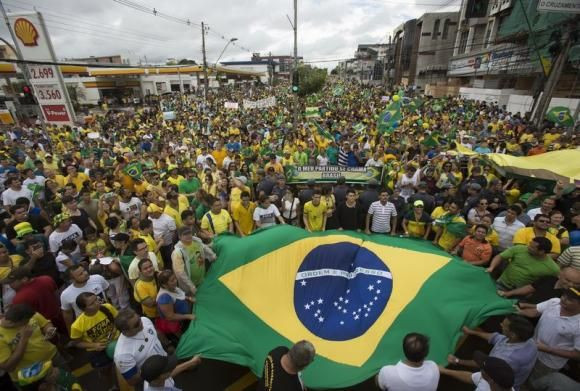Brazil Protests: More Than 1M Demonstrate, Demand Impeachment Of President Dilma Rousseff

Some 1 million Brazilians took to the streets Sunday to demand the ouster of President Dilma Rousseff. Brazilian newspaper O Globo reported the biggest protest was in Sao Paulo, where more than 100,000 demonstrators braved rain to protest higher taxes, poor public services and increased prices for government-regulated items, including gasoline.
Demonstrations also were reported in Brasilia, Belo Horizonte, Belem and along Copacabana beach in Rio de Janeiro. No violence was reported.
Telesur reported some of the demonstrators called for the military to remove Rousseff from office.
“It’s important because it signals what kind of pressure the government will face in coming months from the streets,” Joao Augusto de Castro Neves, Latin America analyst at Eurasia Group, told Bloomberg from Washington. “Potentially, it could grow as the economy starts to take more of a hit from recession and all the adjustment measures they’re implementing.”
Rousseff, just three months into her second term, has been beset by a deteriorating financial situation and scandal involving the state oil company Petrobras. The unrest also is exacerbated by water shortages and the possibility of energy rationing as a result of the worst drought in eight decades.
#SMH Brazilians marching for a "constitutional military intervention". Banner in English pic.twitter.com/6palwX7xXX via @malvados @cadurmoura
- giantpandinha (@giantpandinha) March 15, 2015
Rousseff's efforts to maintain the country's investment-grade credit rating by raising taxes to erase a budget deficit met with resistance from not only the public but from her political coalition. Reuters reported the country is expected to fall into recession this year, with inflation running at a 10-year high and Brazil's currency down 22 percent against the dollar this year.
“More important than [Sunday’s turnout] will be whether these protests lead to a more sustained … movement, including that of organized labor,” Neves told the Financial Times. “Episodes like these will only become more common as the fiscal adjustment hits the labor market and threatens benefits to special interests.”
Meanwhile, Brazil's Supreme Federal Court announced an investigation of congressional leaders and more than 30 other lawmakers, most from Rousseff's party. Prosecutors allege Petrobras executives and major construction companies have been skimming funds from contracts and funneling the money into political parties. Rousseff chaired Petrobras when the alleged corruption occurred but has denied any involvement.
© Copyright IBTimes 2024. All rights reserved.






















